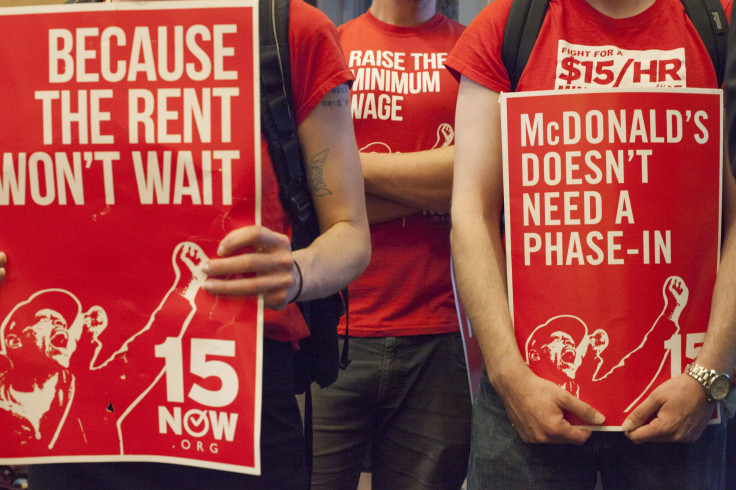Minimum Wage Boost In Seattle Faces Legal Challenge From Franchise Lobby

Next month, the nation’s biggest minimum wage hike takes effect. But its impact could be dulled if the franchise lobby has its way in court.
Under Seattle’s two-tiered, multi-year wage boost, small businesses will start paying at least $10 an hour by April 1, and $15 by 2021. Companies with more than 500 employees -- a category that includes fast-food franchises like McDonald’s and Burger King -- have a tighter window. They’re supposed to pony up $11 an hour as of next month, reaching $15 by 2018.
But the nation’s top franchise lobby, the International Franchise Association (IFA), has cried foul. It says the city ordinance discriminates against its members by lumping them in with other big businesses. On Tuesday morning, lawyers for the group will make their case in federal court, asking for an injunction.
“We’re not asking for something huge,” Matt Haller, a spokesman for the IFA, says. “We’re asking for equal treatment.”
The lawsuit asks that franchisees be treated like other small businesses and be granted the more generous time frame to comply with the law. The franchise model is especially common at hotels and in the low-wage fast-food sector, a major source of job growth since the recession. Even though franchisers typically extract fees from franchisees in exchange for goods and services, the lobby maintains that franchisees are independent business owners.
“They face the same challenges faced by other small businesses,” Haller says.
David Rolf, president of Service Employees International Union (SEIU) Local 775, says that “doesn’t pass the straight-face test.”
“I think most people know these are not individual small businesses. These are giant global entities that generate billions of dollars in return to their shareholders,” Rolf, a leader behind Seattle’s wage hike in addition to a prior boost in nearby SeaTac, says. “It’s clear this industry will do anything it can to stop workers from making a living wage.”
The Union Specter
It’s an especially hot topic, with recent labor-backed protests raising the specter -- still far off -- of unionizing the sector en masse.
Companies like Subway and Taco Bell have traditionally been able to skirt labor demands by arguing, with sufficient legal backing, that individual store operators -- not bigwigs in corporate headquarters -- bear responsibility for setting wages and working conditions on the shop floor. But last December, the National Labor Relations Board (NLRB) officially ruled that franchisers could be considered “joint employers” with franchisees when it comes to labor violations.
“That decision suggests that companies wield a great degree of control over the workplaces of their franchisees, including the pay practices of the workplace,” says Catherine Ruetschlin, senior policy analyst at Demos, a left-leaning think tank.
Industry leaders and lobbyists loathe the new NLRB standard, which they see as a gift to Big Labor. For them, the Seattle law is part of the same broad, union-orchestrated assault on the franchise business model. The lawsuit, says Haller, is fundamentally about protecting that model.
Whatever the outcome of the case, Ruetschlin says, franchises can easily afford the wage hike by, if necessary, toning down the sizable fees they extract from store operators. “They could make this easier for the franchisees if the wanted to,” she says. “They could step up to the plate.”
Rolf, too, believes local employers can stomach the uptick in labor costs.
“Do they need time to adjust? Maybe you can make that argument, which is what the bill does,” Rolf says. “It’s hard to make the argument that low wages are anything but a business strategy for these companies, not something that the market is somehow forcing on them.”
The lawsuit also raises strategic questions for minimum wage advocates, who in the absence of federal action, have successfully passed wage hikes in dozens of municipalities and states.
“We wouldn’t be here if they had passed a uniform wage increase,” Haller says.
Seattle’s two-tiered, phased-in approach is the result of a labor-management compromise brokered by the mayor’s office last year. Other major cities that have approved wage boosts include Chicago and San Francisco. Both provide for phased-in increases but do not treat employers differently by size. The new law in San Francisco has come under fire for leading to the closure of popular small businesses like an independent science fiction bookstore.
© Copyright IBTimes 2024. All rights reserved.












